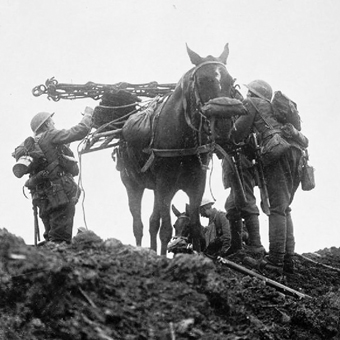Steven Spielberg’s latest film is a testament to war’s silent soldier.
“Home is the sailor, home from the sea, and the hunter home from the hill,” wrote Robert Louis Stevenson in his poem “Requiem.” But when, we have wondered since Homer penned The Odyssey, will the soldier be home from the war? Will those who come back from war ever really get all the way home? This is a question that haunts our greatest contemporary filmmaker.
War Horse is Steven Spielberg’s fourth war movie, following Schindler’s List, Saving Private Ryan, and War of the Worlds. And though each of Spielberg’s war films is chock-full of heroes and adventures, these films are not heroic stories about the glory of battle, conquest, or victory. Spielberg’s protagonists do not charge into battle to defend freedom, justice, or national honor. Rather, they are involuntarily conscripted, unwilling participants in war’s murderous drama; for Spielberg’s tales of war are invariably told from the perspective of its countless victims, characters struggling to survive, fighting to protect their loved ones. In these stories the heroes do not want glory or victory, only a chance to go—or bring their loved ones—home.
Schindler’s List recounts the horror of the Holocaust from the perspective of its victims and focuses on the struggles of one German war profiteer to save the lives of hundreds of Polish Jews headed for slaughter in the Nazi death camps. Saving Private Ryan tells the story of the greatest land invasion battle ever waged from the viewpoint of a handful of ordinary and exhausted infantrymen commanded to risk their lives to bring home a mother’s sole surviving son. And War of the Worlds, Spielberg’s remake of H. G. Wells’ sci-fi classic, is a story of war refugees fleeing before the advancing columns of an invading army and follows one terrified father fighting to keep his children safe from slaughter.
And now, in War Horse, Spielberg’s adaptation of Michael Morpurgo’s novel and the hit play it inspired, we are introduced to the legions of horses conscripted into World War I, in a tale about one stallion making his way home from the slaughterhouse of trench warfare to the green fields of Devon, England.
Joey, the hero of War Horse, is a half-thoroughbred stallion purchased at auction by tenant farmer and Boer War veteran Ted Narracott (Peter Mullan). But it is Ted’s son Albert who comes to love Joey, training him for the plow and riding him madly across the rolling English countryside—two young souls dashing as one over field and fence. With the onset of war Joey is sold to the army and sent off as a cavalry mount, leaving behind a desolate and determined Albert—who vows to find Joey and fetch him home to Devon.
But this will be a hard promise to keep, as Joey is sucked into the maelstrom of World War I, encountering first the slaughter of the English cavalry by modern mechanized warfare, then being pressed into service as a draft horse pulling cannon and wagons through mountains of grey, oozing mud, and finally being trapped in the deadly no-man’s-land between opposing trenches of the war that bled out a generation of Europe’s sons.
Joey, like all the conscripts from every nation drafted into this murderous folly, has descended into the lower rings of Dante’s Inferno and dreams (if horses do) only of Devon and going home.
And this is Joey’s quest, to find some way back home, to fly above the war and, keeping his eyes forward, look for a way back to those he loves and cherishes. Like Ulysses, Joey must travel through strange and sometimes terrible places to get to his destination: crossing borders, encountering enemies and dangers, making friends, and trusting through all of this that somewhere out there his beloved Albert, like Ulysses’ Penelope, is waiting and watching for him.
The genius of War Horse is that Spielberg has made our returning soldier mute. Like so many troops returning from war, Joey has no language with which to express the horror he has seen or done or the terror he has felt. Young people, silent and reclusive in ordinary times, are often struck dumb by the spectacle of war and can find no words to describe its horror. Language and stories, used to give shape and meaning to our lives, are often stripped from those who return from war—and so Joey becomes a perfect stand-in for the soldier who cannot fashion words to describe where he has been or who he has become.
It seems appropriate that War Horse should be released just as the last troops are returning from another senseless war. As we sit in theaters weeping for the return of Joey and Albert, thousands of our own are returning home from a war we should not have waged. And like Joey and Albert, thousands of these veterans will find it hard to find their way home. Along with the more than 30,000 wounded troops are more than 300,000 suffering from depression or post-traumatic stress disorder, and more than 300,000 with minor or severe brain injuries.
Where will these men and women find the words to tell us their stories? Perhaps we, like Albert, must simply look long and lovingly into their eyes, and resolve never to send them there again.















Add comment